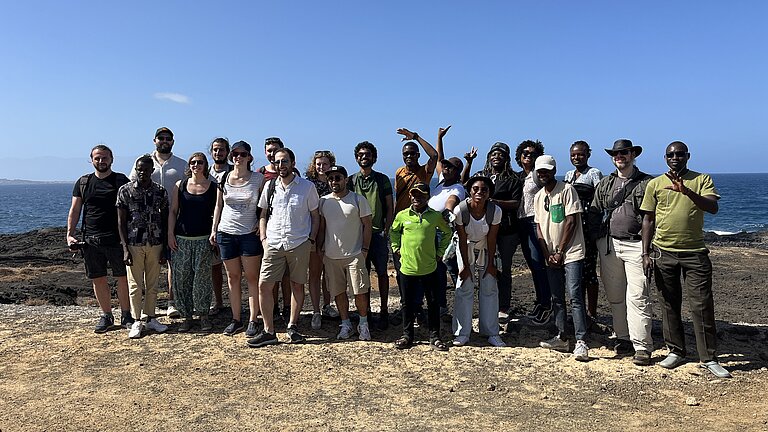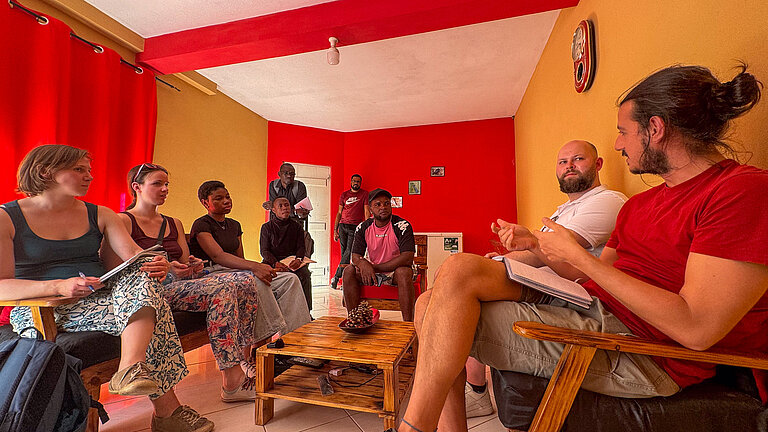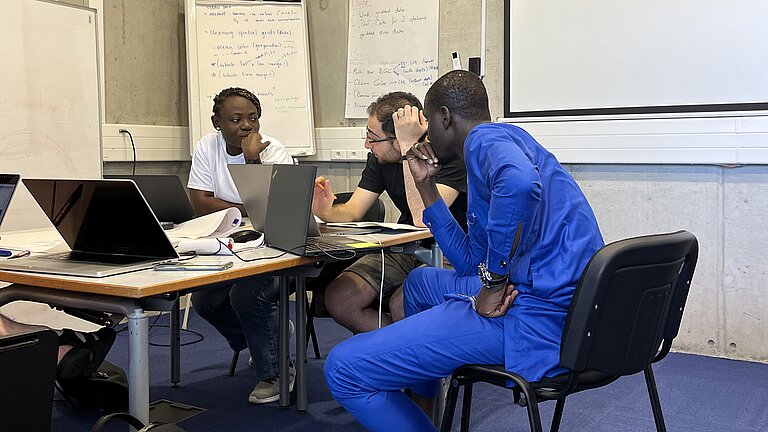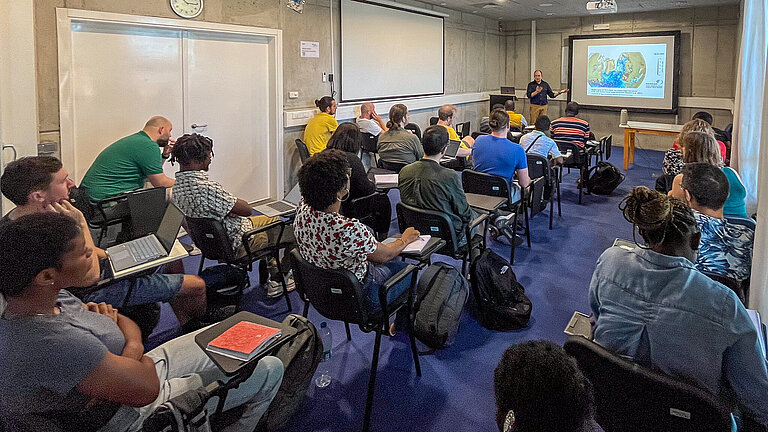GEOMAR Helmholtz Centre for Ocean Research Kiel
Wischhofstr. 1-3
24148 Kiel
GERMANY
Media requests: media(at)geomar.de
Events and all other topics: outreach(at)geomar.de
With its pristine coastline, crystal-clear waters, and fascinating underwater world, the Cape Verde Islands are well known to travellers who enjoy diving, hiking and beach holidays. But the archipelago west of Senegal is also important to many researchers: the ecosystem nourished by the coastal upwelling off West Africa is one of the most productive and economically significant in the world. For many years, scientists have been trying to unlock the secrets of the ocean and find solutions to challenges such as climate change. One of the most important products of their work is ocean data.
To explore the enormous potential of these datasets, the Helmholtz School for Marine Data Science (MarDATA) organised a project week on the Cape Verdean island of São Vicente. From 10 to 18 March, twelve MarDATA doctoral researchers met with students of the local WASCAL Master's programme "Climate Change and Marine Sciences" and local scientists at the Ocean Science Centre Mindelo, jointly operated by the GEOMAR Helmholtz Centre for Ocean Research Kiel and the Cape Verdean partner Instituto do Mar (IMar). The aim of the project week was to develop approaches and solutions in a so-called hackathon ("to hack" and "marathon") that highlight the value of ocean data for both local stakeholders and the scientific community.
Dr Enno Prigge, scientific coordinator of MarDATA at GEOMAR, initiated the project week and is enthusiastic about the results: "We had prepared three challenging tasks, and what the teams presented here after intense days of work is really impressive!"
One challenge was to improve an app for local fisheries, making it easier to record catch data with a smartphone and integrate it into local fisheries management. During a visit to the small community of Calhau in the east of the island, the young data scientists learned that the fishermen also wanted an emergency call function. By the end of the project week, they had automated the data processing of the smartphone app and added the emergency call function.
The second challenge was the supply of nutrients to the rich marine biology around the Cape Verde Islands. Two of the main sources are coastal upwelling and dust input, mainly from the Sahara. While one team developed an interactive visualisation combining dust, plankton, and other environmental data, another team worked on detecting and predicting upwelling events using machine learning.
Task number three built on the previous ones: to develop a concept for a "Digital Twin Cabo Verde". Digital twins of the ocean consist of simulations of the ocean that reflect the real ocean. The ocean and its simulation in the digital twin are linked by an exchange of information: observations and measurements are made in the real ocean, and recommendations for a future ocean are derived from the simulated ocean. The concept has been designed with local interests in mind, allowing users to explore selected datasets and upload their own data.
"During the project week, the participants were able to test their understanding of fundamental marine scientific processes and their data analysis skills in a new, unfamiliar, and interdisciplinary environment," summarises Arne Biastoch, Professor of Ocean Dynamics and MarDATA spokesperson at GEOMAR. "The proximity to application and the collaboration with the WASCAL Master's programme and local stakeholders is a great gain for both sides".
The participants were also very satisfied with the week. In addition to the exciting scientific exchange, the close cooperation across status groups and cultural differences will remain in their memories. Everyone is already looking forward to next year’s reunion, when the WASCAL students will dock with the research vessel POLARSTERN in Germany as part of their training as a "floating university".
Background MarDATA
The "Helmholtz School for Marine Data Science" (MarDATA) trains marine data scientists. Young researchers from computer science, informatics, and mathematics work together on marine topics, from modelling on supercomputers, and robotics to statistics and big data methods. They are supervised by scientists from the GEOMAR Helmholtz Centre for Ocean Research Kiel and the Alfred Wegener Institute, Helmholtz Centre for Polar and Marine Research (AWI) in cooperation with the Universities of Kiel and Bremen. The broad interdisciplinary training in block courses, summer schools, and colloquia aims to promote innovative handling of marine scientific data.
Background on WASCAL
The West African Science Service Centre on Climate Change and Adapted Land Use (WASCAL) is a research centre in West Africa that aims to help address the impacts of climate change and improve the resilience of people and ecosystems. WASCAL strengthens the regional climate change research infrastructure. Twelve West African countries and Germany are working together to achieve this. The centre is funded by the German Federal Ministry of Education and Research (BMBF) and implemented by West African and German partners.
The WASCAL Master's programme "Climate Change and Marine Sciences" at the Cape Verdean Universidade Técnica do Atlantico (UTA) is run by the National Fisheries Development Institute (Instituto Nacional de Desenvolvimento das Pescas, INDP) of Cabo Verde in cooperation with German partners such as GEOMAR, the Christian-Albrechts University of Kiel (CAU) and the Thünen Institute. The cooperation provides scientific and academic skills in climate, marine science and management at international and regional level in West Africa in the context of climate change.

Twelve MarDATA doctoral researchers met with students from the WASCAL Master's programme for a project week in São Vicente. Photo: Enno Prigge, MarDATA

The teams working to improve the Fisherman app met with fisherman Osvaldo Bedji in Calhau to discuss his experiences with the app. His suggestion to integrate an emergency call function was implemented during the project week. Photo: Tobias Hahn, GEOMAR

Discussions and programming take place in the rooms of the Ocean Science Centre: WASCAL students explain marine science contexts, while MarDATA PhD students write line after line of Python code. Photo: Enno Prigge, MarDATA

Professor Arne Biastoch gives a lecture to the interdisciplinary group of students. There will be a reunion in 2025, when the WASCAL students will come to Germany as part of their training with the "floating university" on the research vessel POLARSTERN. Photo: Enno Prigge, MarDATA

